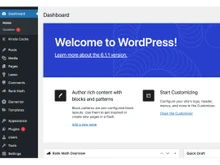WordPress and Shopify are two of the most popular Content Management Systems (CMS) out there for building a website or an online store. Even though both of the platforms come with all kinds of great tools, they are geared towards two slightly different ends. Let this comparison guide you choose the right platform that would cater to your needs.
In this comparison, we’ll take a look at an in-depth comparison of WordPress and Shopify so that you can decide the best choice for your website building requirements.
WordPress vs Shopify: Overview
Shopify is the king of e-commerce. This platform that literally offers everything you need to start, manage, and scale an online store. Shopify is perfect for businesses that need a simple setup and user-friendly platform, since it covers the hosting as well as security. It is an ideal platform especially for those without design or coding skills.
WordPress is the most used platform for building websites online. Infact, over 40% of websites on the internet are built with WordPress. It works great even if you want to create an exclusive website or even an online store (using WooCommerce). But this has a steeper learning curve, and you have to deal with hosting, security, plugin management.
Shopify Pros and Cons
Shopify Pros:
- Offers an all-in-one platform that includes hosting, security, updates, and backups.
- The platform is easy to set up and user-friendly, especially for beginners.
- Provides you with 24/7 support via live chat and email.
- They have an extensive app store with over 8,000 integrations.
- It offers built-in sales features such as abandoned cart recovery and multichannel integration.
Shopify Cons:
- You have limited customization options unless you know how to code.
- More expensive than WordPress, especially as you add on more features and extras.
WordPress Pros and Cons
WordPress Pros:
- WordPress is highly customizable and allows you to use thousands of free and paid themes and plugins.
- It is generally cheaper for most users because of the reduced cost of themes and plugins.
- You have complete control over every part of your website.
- It has excellent SEO capabilities, thanks to free and paid plugins.
- Suitable for both content-rich websites and those that need more advanced e-commerce features.
WordPress Cons:
- Requires more time and expertise to set up.
- Extra costs related to factors such as hosting, themes, and premium plugins.
- You can’t get direct customer support since it relies on community forums and plugin-specific help systems.
Shopify vs WordPress: In terms of Features
- Both Shopify and WordPress offer multiple features for your online store or website. Let's take a look how do they differentiate each other when it comes to features:
- Customization: Shopify provides pre-built, professionally designed themes that are easy to use but limited in flexibility without coding. WordPress, with WooCommerce, offers near-limitless customization options, making it perfect for those who want a truly unique site.
- Templates: Shopify features approximately 100 themes; several of them are costly. In terms of design, WordPress definitely wins hands down having over 11000 themes with loads being free so there's a lot more choice.
- E-commerce Features: Shopify shines in ecommerce with features such as inventory management, secure payments and multi-channel selling. WordPress plus WooCommerce is a bit feature-similar but less integrated and would require more setup.
- SEO and Marketing: Both platforms come with a range of solid SEO tools. WordPress allows for greater levels of control, through the use of plugins. Shopify has SEO features that are beginner-friendly compared to WordPress, but for better customization, WordPress has a clear upperhand.
WordPress vs Shopify: Sales Features and Integrations
Shopify is designed specifically for selling online, with built-in features like abandoned cart recovery, discount codes, and multichannel integration (e.g., selling on social media platforms). Its app store includes thousands of integrations that enhance store functionality.
WordPress (using WooCommerce) offers a vast array of plugins for virtually every e-commerce need. While this provides incredible flexibility, managing and integrating these plugins can be time-consuming and sometimes costly.
WordPress vs Shopify: Hosting
With integrated hosting, Shopify makes it simple to create your store without the burden of third-party services. When you build a store on Shopify, all the complexity like security,maintenance etc are well taken care of by them so that your site will always run smoothly.
WordPresss at the same time, does not come with hosting; you need to pick a host and install it yourself. This offers more flexibility in terms of performance and cost but requires more technical involvement to manage.
Shopify vs Wordpress: Ease of Use
Shopify has one of the most beginner-friendly dashboards out there. It allows users to drag and drop things into place, so that they can add products quickly, design pages easily and manage the sales without having to be an expert developer.
Whereas, WordPress requires slightly more of a learning curve because there is some work installing plugins and potentially modifying code. But, it offers best flexibility with tens of thousands themes and plugins which makes it an ideal choice for those that are experienced at a more hands-on manner.
WordPress vs Shopify: Customer Support
Shopify provides 24/7 support via chat, email and has an extensive help center including: tutorials & guides Perfect for any user in a hurry to get the answers or help.
On the other hand, WordPress’s support isn’t great as compared to Shopify. It offers community-based customer support with forums, blogs, and tutorials. Paid themes and plugins often come with dedicated support, but troubleshooting can be slower and requires more self-guided research.
WordPress vs Shopify: Pricing
Shopify offers various pricing plans to suit different business needs. The Basic plan starts at $29/month, the Shopify plan costs $79/month, and the Advanced plan is $299/month, all with features tailored to business growth. There’s also a Plus plan starting at $2,300/month for enterprise-level needs.
On the other hand, WordPress is free to start but requires costs for hosting, themes, and plugins, which can vary widely. Basic hosting starts around $5/month, but more advanced setups can go up to $120/month.
Which is Better: WordPress or Shopify?
Shopify is a great tool if you'd like an all-in-one solution to launch your online store quickly and easily. It is also a great option for small to medium businesses, especially those who value convenience and award-winning customer service.
On the surface, WordPress is perfect for people who want to have total control over their website. It is perfect for businesses needing a highly customized site and have the time or skills to run it,
At the end of the day, whether you choose Shopify or WordPress will come down to your needs, budget and how comfortable you are working with technical stuff.


 16 Ratings & 16 Reviews
16 Ratings & 16 Reviews




























